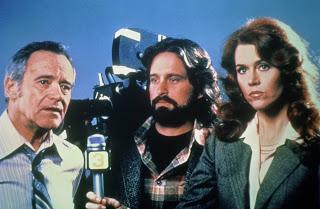 The last great '70s thriller, The China Syndrome (1979) earned immortality by coming out twelve days before Three Mile Island's near-meltdown. Nuclear power remains controversial but that's only one topic explored in this fascinating, multilayered film.
The last great '70s thriller, The China Syndrome (1979) earned immortality by coming out twelve days before Three Mile Island's near-meltdown. Nuclear power remains controversial but that's only one topic explored in this fascinating, multilayered film.Journalist Kimberly Wells (Jane Fonda) visits the Ventana nuclear power plant in California, witnessing an accident narrowly averted by manager Jack Godell (Jack Lemmon). Cameraman Richard (Michael Douglas) surreptitiously films the accident, and Kim wants to run it - but she's stymied by their boss (Peter Donat). Richard steals the footage and takes it to the Nuclear Regulatory Condition. The company runs damage control, from media denials to strong-arm threats, and prepares to put the plant back online. However, Jack grows convinced that the issue's more serious than it initially appeared, willing to take any action to avert catastrophe.
The China Syndrome became a fictional rallying cry for anti-nuclear activists, which Three Mile Island, Chernobyl and more recently Fukushima only intensified. If Syndrome somewhat exaggerates the dangers, its portrayal of corporate cost-cutting seems is more solidly grounded. The plant duped an inspector to avoid bureaucratic hassles and save money, an understandable but potentially fatal cost-cutting members. Similar events could happen in any industry, but rarely with such catastrophic potential. Human lives become secondary to the bottom dollar.
Alongside its message of corporate accountability, Syndrome probes journalistic ethics. In the post-Watergate era it's not shocking to see intrepid reporters crashing a story, nor hirsute rebel Richard, a cross between Bob Woodward and Richard Dreyfuss in Jaws. Kimberly's the interesting hook here, an anchor more used to human interest stories about whales and lion cubs; yet she recognizes a breaking story when she sees it. It's sadly credible that a news team would fold before fears of corporate lawsuits. If CBS folded before the tobacco industry, what chance has a Los Angeles local against a major power company?
Director James Bridges films in detached yet gripping style; without musical score, events unfold in tense, understated fashion. Bridges stages the initial near-meltdown with, allowing small (a rippling coffee cup and stuck gauge) that disaster. The film introduces some third act corporate goons to spice things up, culminating in a car chase that's exciting but not strictly necessary. The film regains its bearings afterwards, with a tense standoff as Jack commandeers the power plant. The finale's murky enough that the "truth to power" message seems muddled; will Kim's pronouncements get through, or become one unreliable voice against corporate spin doctors?
Jack Lemmon scores with an intense performance, his faith in the system eroded by bullheaded superiors. Lemmon underplays even Jack's breakdown, a nuanced performance among that actor's best. Jane Fonda's equally solid as a fluff journalist struggling to be taken seriously. Michael Douglas is the weak link, an abrasive hippie hero all-too-common in '70s cinema. Wilford Brimley (The Firm) stands out as Jack's conflicted floor manager. Peter Donat (The Godfather, Part II), James Karen (Nixon) and Richard Herd (The Onion Field) handle supporting roles.
Curiously, The China Syndrome hasn't endured as a perennial like All the President's Men or other contemporaries. True, it rode to success by tackling (and sensationalizing) a hot button issue, but that issue hasn't disappeared. Topical or not, its simple, assured craftsmanship marks it as a classic.

